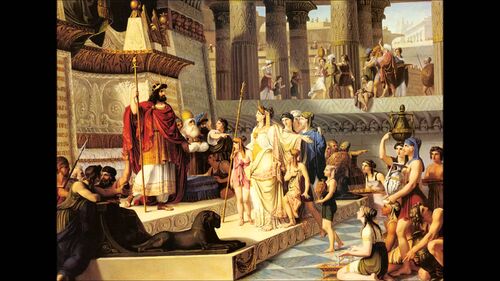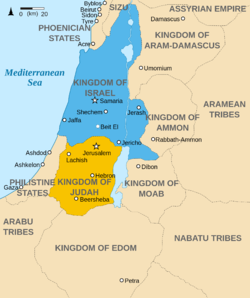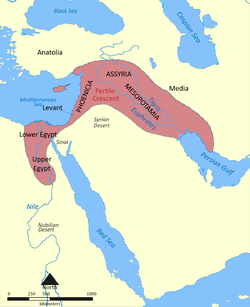Category:Kings (subject)
|
< Kings : {Judges} -- United Monarchy (1047-930 BCE) -- Kingdoms of Judah and Israel (930-722 BCE) -- Neo-Assyrian Period (722-626 BCE) -- Kingdom of Josiah (626-609 BCE) -- Neo-Egyptian Period (609-605 BCE) -- Babylonian Period (605-539 BCE) -- {Second Temple Judaism}> < People : Kings of Judah - Kings of Israel -- Saul - David - Solomon - Hezekiah - Josiah > < Hebrew Bible Studies: (1) Creation - (2) Progenitors - (3) Patriarchs - (4) Exodus - (5) Judges - (6) Kings -- Babylonian Exile -- Second Temple Studies >
Kings -- Literary Sources |
|
Overview
The origins of Israel are obscure. The Jewish tradition provides a series of accounts that give a "foreign" origins to Israel from Mesopotamia (the Patriarchs) and Egypt (the Exodus). After "conquering" the land of Israel the Israelite tribes lived as a confederation under ad hoc charismatic leaders called Judges.
Between 1047 BCE and 930 BCE the Israelite tribes supposedly unified as a United Monarchy under Saul (1047-1010) and then under the dynasty of the House of David: David (1008-970) and his descendants, Solomon (970-931) and Rehoboam (931-930).
Around 930 BCE, the country split into two kingdoms: the Kingdom of Israel (including the cities of Shechem and Samaria) in the north and the Kingdom of Judah (containing Jerusalem) in the south.
Neither ancient sources nor archaeology give any support to the mythical origins of Israel. Everything seems to point out that Israel was one of the native peoples of Canaan.
The first reference to "Israel" appears in the Merneptah Stele (around 1207 BCE) in a list of Canaanite tries subjugated by the Pharaoh in a military campaign in the region.
The united monarchy is also held by contemporary scholarship to be a literary construction and not a historical reality. It is generally accepted that a House of David existed, but his power was limited to the small Kingdom of Judah, while the northern kingdom was a separate development.
The kingdoms of Judah and Israel were two of the several small kingdoms that existed at the time in the Syria-Palestine region (also called Canaan). Their political fortunes (as well as the fortunes of the other Canaanite kingdoms) depended on the mood of two powerful neighbors, Egypt and Mesopotamia. The region of Canaan was poor but strategically important; it was the bridge between the two superpowers of antiquity and consequently, the battlefield of their ambitions of expansion.
The history of the two kingdom in their early stages is quite obscure for the lack of documentation. It becomes clearer starting from the 8th century BCE, as it was recorded also in Assyrian and Babylonian sources.
From 722 to 626 BCE the area was under Assyrian control (see Neo-Assyrian Period, then after a period of independence under Josiah (626-609 BCE) it was from 609 to 598 BCE under Egyptian control (see Neo-Egyptian Period), until it fell in 598 BCE under Babylonian control (see Babylonian Exile).
The Israelite Religion at the time of the Kings
- See Ancient Israelite Religion -- Child Sacrifice -- Asherah -- Josiah -- Sheol -- Son of God
Pages in category "Kings (subject)"
The following 150 pages are in this category, out of 150 total.
1
- == == 1450s == == ==
- == == 1500s == == ==
- Orlando furioso (The Frenzy of Orlando / 1516 Ariosto), Italian poem
- Samuel Anoints David (1555 Veronese), art
- David and Goliath (1600 Caravaggio), art
- David with the Head of Goliath (1605 Reni), art
- David with the Head of Goliath (1607 Caravaggio), art
- David with the Head of Goliath (1610 Caravaggio), art
- David Slaying Goliath (1610 Reni), art
- David Slaying Goliath (1615 Rubens), art
- The Judgment of Solomon (1617 Rubens), art
- Dialogo di David (David and Goliath / 1619 Anerio), sacred dialogue
- David with the Head of Goliath and Two Soldiers (1622 Valentin), art
- David (1624 Bernini), art
- David with the Head of Goliath (1625 Tanzio da Varallo), art
- Triumph of David (1630 Poussin), art
- Saul and the Witch of Endor (1635 Stom), art
- David and Bathsheba Mourning over Their Dead Son (1645 Koninck), art
- Samuel Anoints David (1645 Victors), art
- Saul Attacking David (1646 Guercino), art
- Bathsheba Receiving David's Letter (1654 Drost), art
- The Shade of Samuel Appears to Saul (1668 Rosa), art
- David Playing the Harp (1670 Bray), art
- Samuel Anoints David (1670 Preti), art
- Judicium Salomonis (The Judgment of Solomon / 1702 Charpentier), oratorio
- Die unglückselige Princessin Michal und der verfolgte David (1707 Lehms), novel
- Des israelitischen Printzens Absolons und seiner Prinzcessin Schwester Thamar (1710 Lehms), novel
- Der weise König Salomo (1712 Lehms), novel
- The Chronology of Ancient Kingdoms Amended (1728 Newton), book
- Saul (1739 Haendel / Jennens), oratorio
- King David Playing the Harp (1739 Tiepolo), art
- Saul convencido por David (David Convinced Saul / 1742 Figuera), oratorio
- Solomon (1749 Haendel), oratorio
- Saul (1782 Alfieri), play
- Transportation of the Ark of the Covenant (1816 Ademollo), art
- Transportation of the Menorah (1816 Ademollo), art
- David and the Ark of the Covenant (1828 Ademollo), art
- Triumph of David over Goliath (1828 Ademollo), art
- David (1834 Chaponnière), art
- Toilet of Bathsheba (1834 Hayez), art
- The History of Josiah, the Young King of Judah (1837 Gallaudet), book
- Samuel Anoints David (1842 Barrias), art
- Samuel Anoints David (1842 Benouville), art
- Samuel Anoints David (1842 Biennourry), art
- Elijah (1847 Mendelssohn / Klingemann, Bartholomew), oratorio
- The Throne of David (1860 Ingraham), novel
- La reine de Saba (The Queen of Sheba / 1862 Gounod), opera
- The Shepherd of Bethlehem, King of Israel (1862 Tucker), novel
- Jeremiah (1883 Naylor / Ellerton), oratorio
- Judith; or, The Regeneration of Manasseh (1888 Parry), oratorio
- The Heart of Sheba (1890 Hewitt), novel
- Sulamith (1892 Osmond), novel
- Di Koningin fan Skeba; of, Salomo syn oue goudfelde in Sambesia (The Queen of Sheba / 1898 Du Toit), novel (Afrikaans)
- The Heart of David, the Psalmist-King (1900 Heaton), poetry
- The Founders and Rulers of United Israel from the Death of Moses to the Division of the Hebrew Kingdom (1908 Kent), book
- A Man of Valor (1908 Spalding), novel
- Saul and David (1909 Blackton), short film
- The Judgment of Solomon (1909 Blackton), short film
- David and Goliath (1914 Weisgerber), art
- Jonathan (1916 Benrath), novel
- The Chosen Prince; or, The Friendship of David and Jonathan (1917 Mong), feature film
- La Sacra Bibbia (After Six Days / 1920 Garlazzo, Vey), feature film
- The Queen of Sheba (1921 Edwards), feature film
- Le roi David (King David / 1921 Honegger / Morax), oratorio
- The Shepherd King (1923 Edwards), film
- David (1924 Southwell), feature film
- Die Josianische Reform und ihre Voraussetzungen (1926 Bentzen), book
- Le berceau de dieu (The Cradle of God / 1926 Granville), feature film
- Giant Killer (1928 Davis), novel
- Jehovah's Man (1941 Randall), novel
- Amos (1946 Hammershaimb), book
- David, the King (1946 Schmitt), novel
- The Herdsman (1946 Wilson), novel
- Women in the Old Testament: Twenty Psychological Portraits (1949 Lofts), novel
- David and Bathsheba (1951 King), feature film
- Solomon and the Queen of Sheba (1954 Ormonde), novel
- The Unanointed (1958 Chinn), novel
- Absalom, My Son (1959 Leisen), TV film
- Solomon and Sheba (1959 Williams), novel
- Las visitas de la Reina de Saba (The Visits of the Queen of Sheba / 1960 Serrano), novel
- König David (1961 De Wohl), novel
- Rizpah (1961 Israel), novel
- A Story of David: The Hunted (1961 McNaught), film
- David of Jerusalem (1963 De Wohl / Abbott), novel
- Saul e David (1964 Baldi), film
- Koning David (KIng David / 1965 De Meester, Langeraad), TV film
- Der König David Bericht (The King David Report / 1972 Heym), novel
- The King David Report (1973 Heym), novel (English ed.)
- Davide (1976 Coccioli), novel
- The Story of David (1976 Rich, Segal), film
- Greatest Heroes of the Bible: David & Goliath (1978 Conway), TV episode
- David at Olivet (1979 Hamilton), novel
- Shadow of the Rock (1979 Wright), novel
- Bathsheba: The Love Story that Changed History (1980 Dorr), novel
- Abigail (1980 Henderson), novel
- Solomon & Sheba (1980 Levine), novel
- King of Kings (1980 Martin), novel
- Bat Sheba (1984 Lindgren), novel
- After Goliath (1985 Cassill), novel
- The Greatest Adventure: David and Goliath (1985 Patterson), animated TV short film
- David and Goliath (1986 Benagh), novel
- Bathsheba (1988 Lindgren / Geddes), novel (English ed.)
- Der Brautpreis (1988 Weil), novel
- King Saul in the Historiography of Judah (1991 Edelman), book
- The Bride Price (1991 Weil / Barrett), novel (English ed.)
- Tamar (1994 Chamberlin), novel
- David (1995 Cohen), novel
- Bathsheba (1995 Shott), novel
- Solomon & Sheba (1995 Young), TV film
- The Reform of King Josiah and the Composition of the Deuteronomistic History (1996 Eynikel), book
- David and Saul (1996 Hurst), animation
- Abigail (1996 Shott), novel
- Le Livre des Rois (1997 Buis), book
- David (1997 Markowitz), TV film
- Solomon (1997 Young), TV mini-series
- Queenmaker (1999 Edghill), novel
- Chronicle of the Old Testament Kings (1999 Rogerson), book
2
- O Rei Saul segundo Flávio Josefo (2000 Rodrigues), book
- (+) Unspoken (2001 Rivers), novel
- Galen and Goliath (2001 Roddy), novel
- The King and the Cemeteries: Toward a New Understanding of Josiah's Reform (2002 Barrick), book
- David et Goliath (2002 Maddeddu), short film
- Solomon the Esoteric King (2002 Torijano), book
- God King (2002 Williamson), novel
- Jacob's Ladder (2003-04 Engel), TV series
- Wisdom's Daughter (2004 Edghill), novel
- The Templars and the Ark of the Covenant (2004 Phillips), arch-fi book
- David & Goliath (2005 Agle & Edson), film
- Abigail's Story (2005 Burton), novel
- David de Jerusalén (2005 De Wohl / Villar), novel
- Bathsheba (2005 McGee), short film
- The Prince (2005 Rivers), novel
- Faith of My Fathers (2006 Austin), novel
- Shepherd Warrior (2006 Booth), novel
- My Abigail (2007 Davis), novel
- La reine de Saba (2008 Halter), novel
- The Goliath Bone (2008 Spillane), novel
- Die Lade Jahwes im Alten Testament und in den Texten vom Toten Meer (The Ark of the Covenant in the Old Testament and the Dead Sea Scrolls / 2009 Porzig), book
- Michal (2009 Smith), novel
- == == 2010s == == ==
- Abigail (2010 Smith), novel
- The Ring of Solomon (2010 Stroud), novel
- Showdown with the Shepherd (2011 Hering, Eastman, McCusker / Hohn), children's novel & art
- Bathsheba (2011 Smith), novel
- Song of King Solomon (2011 Southouse), feature film
- Love's Sacred Song (2012 Andrews), novel
- Goliath (2012 Gauld), graphic novel
- The Legend of Sheba: Rise of a Queen (2014 Lee), novel
- The Secret Chord (2015 Brooks), novel
- Bathsheba: Reluctant Beauty (2015 Hunt), book
Media in category "Kings (subject)"
The following 6 files are in this category, out of 6 total.
- 1952 Francisci (film).jpg 214 × 317; 23 KB
- 1959 Vidor (film).jpg 200 × 298; 39 KB
- 1960 Baldi (film).jpg 214 × 317; 27 KB
- 1981 Spielberg (film).jpg 257 × 389; 191 KB
- 1985 Beresford (film).jpg 290 × 434; 54 KB
- 2013 Downey (TV miniseries).jpg 349 × 500; 67 KB












